| Pages:
1
..
55
56
57
58
59
..
66 |
BobD1001
Hazard to Others
  
Posts: 182
Registered: 29-3-2013
Member Is Offline
Mood: No Mood
|
|
I'm outside Philadelphia, near King of Prussia, Pennsylvania.
|
|
|
blogfast25
International Hazard
    
Posts: 10562
Registered: 3-2-2008
Location: Neverland
Member Is Offline
Mood: No Mood
|
|
Can't help you with that, sorry (ole' Blighty)...
|
|
|
BobD1001
Hazard to Others
  
Posts: 182
Registered: 29-3-2013
Member Is Offline
Mood: No Mood
|
|
Well everyone, after 6 attempts, much frustration, and coming close to giving up.... I have finally successfully produced elemental Potassium!
From what I have gathered after attempting this synthesis 5 times previously (with failure might I add) using a 95% pure Mg alloy, the remainder being
Al, it seems that the purity of the magnesium is important for the reaction. Of course that may still be open to debate and it could have other
unknown errors in my previous runs, however all were documented extensively in my lab notebook, and I believe I have isolated my issue to the purity
of the Magnesium being used.
This 6th run was performed following one of my previous runs lab notes exactly, however I had a new source of Magnesium. This new Magnesium is stated
as 99.95% purity, from galliumsource. Pretty expensive for a little ingot of Magnesium at $15 for .5lb, but well worth it to be able to say I have
produced elemental Potassium.
Anyways here are a couple pictures! currently I am trying to coalesce the Potassium into larger globules.
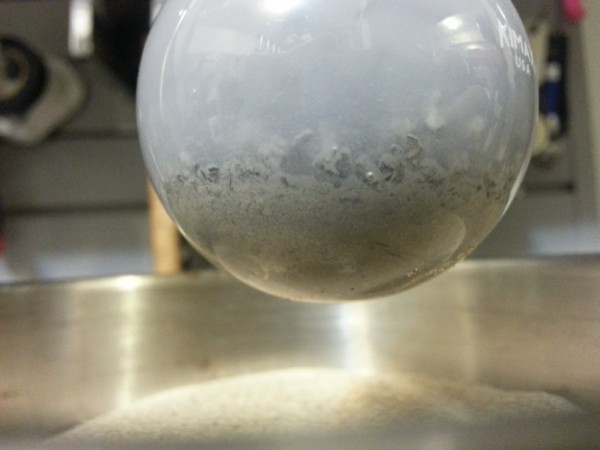

Sorry the pictures are somewhat poor. There are thousands of tiny potassium balls all about the flask, however this picture only shows the 2 larger
globules formed so far.
I will further update with better pictures shortly.
[Edited on 11-7-2013 by BobD1001]
|
|
|
blogfast25
International Hazard
    
Posts: 10562
Registered: 3-2-2008
Location: Neverland
Member Is Offline
Mood: No Mood
|
|
What was the run time at this point?
It does seem a consensus is building on the importance of the magnesium.
|
|
|
Sublimatus
Hazard to Others
  
Posts: 108
Registered: 8-6-2011
Member Is Offline
Mood: No Mood
|
|
I've still had no success with this reaction after many attempts, to the point of nearly losing interest.
My source of magnesium in the later reactions has been the 99.95% thin turnings offered by GalliumSource, which I then threw in a coffee grinder to
reduce down to finer chips, and then roughed up in a mortar and pestle wet with some of the solvent used for the reaction.
Seeing BobD1001's success, I may order one of their rods or ingots and grind off some powder with a file, as I did with a sacrificial anode I had
lying around from RotoMetals for my first few attempts at this.
If that doesn't work, then that should indicate pretty definitively that my hangup is some other factor, such as the solvent, KOH, or reaction
temperature.
|
|
|
BobD1001
Hazard to Others
  
Posts: 182
Registered: 29-3-2013
Member Is Offline
Mood: No Mood
|
|
Just to update my progress a bit:
I had to cut the reaction somewhat short on my 6th attempt (my previous post) so the potassium formed was not a very significant quantity nor did it
have the proper time to coalesce. In my naivety of how difficult it would be, I decided I would just spend some time plucking each little potassium
ball from the reaction liquor and accompanying MgO, Mg fines/flakes, and remaining KOH. Well it turns out it was ridiculously difficult, and I only
obtained a few small balls of elemental potassium. In my next attempts, I will be sure to run the reaction much longer to allow full potassium
formation and coalescence. However, I really just wanted this sample for my element collection, and now have it! Here is the very underwhelming final
result!
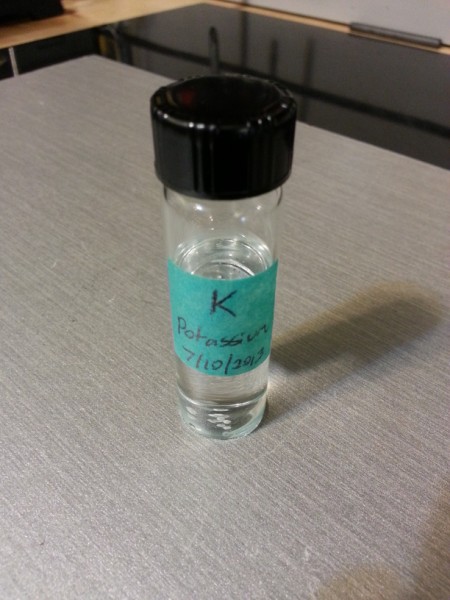
I do have to say however that i may have ended up tossing a couple other little potassium globules into a big bucket of water to see the famed
reaction. Also of note, I simply reacted away the potassium fines into that same bucket of water (make sure you do this outside, as much smoke/vapor
is emitted, which I'm sure contains a significant amount of KOH). It was unbelievably pleasing to see so much potassium auto-igniting upon contact
with water emitting a beautiful violet flame.
|
|
|
BobD1001
Hazard to Others
  
Posts: 182
Registered: 29-3-2013
Member Is Offline
Mood: No Mood
|
|
Already getting ready for my next batch. I decided to really get some fine magnesium turnings/powder for this next run as opposed to using chips from
drilling holes in the Mg as I used last time, so I decided to use my milling machine, and a cardboard box to catch the 'chips'. I took a couple
thousands of an inch off for each pass and performed each pass very slowly, and totaled 7g of very fine magnesium chips (basically extremely high
surface area flake particles). I also made a gram of very fine filings to help with the initial dehydration step. Here's a couple pictures of the
setup and magnesium to be utilized.
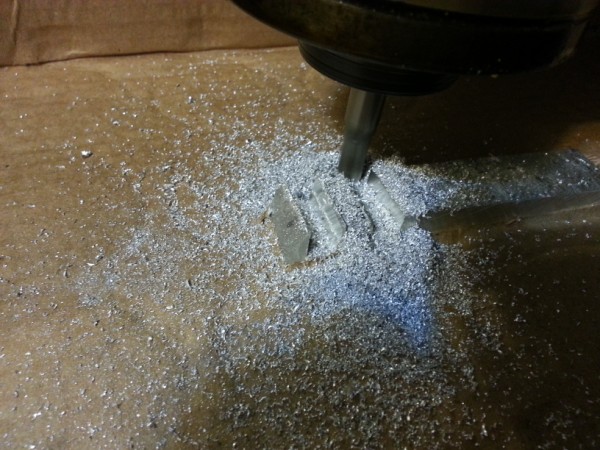
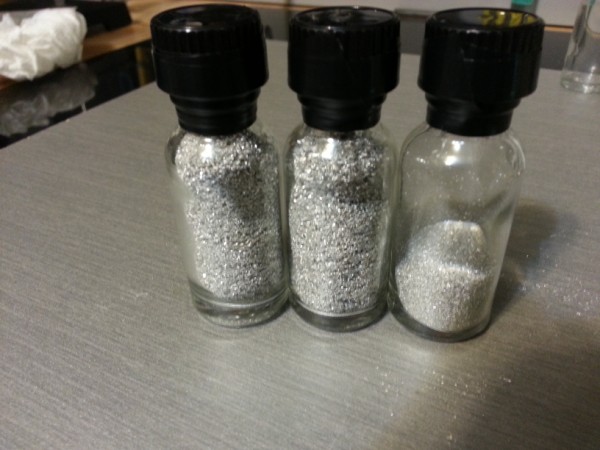
I hope everyone doesn't mind me posting so many pictures. I'm a huge fan of pictorials, and find them highly useful throughout my own ventures in
chemistry.
[Edited on 13-7-2013 by BobD1001]
|
|
|
blogfast25
International Hazard
    
Posts: 10562
Registered: 3-2-2008
Location: Neverland
Member Is Offline
Mood: No Mood
|
|
@Bob:
These look perfectly fine (no pun intended) Mg turnings/shavings. Nice little vials too: where did you get those?
Try and ensure good temp. control (approx. 200 - 220 C) and run long enough (about 4 hours with conventional heavy hydrocarbons solvents). Stir or
swirl the flask occasionally if you can.
[Edited on 14-7-2013 by blogfast25]
|
|
|
BobD1001
Hazard to Others
  
Posts: 182
Registered: 29-3-2013
Member Is Offline
Mood: No Mood
|
|
@blogfast25: The vials were found on Amazon. They are actually the first listing to come up for 4 dram vials from the seller MHB, however they seem to
send everyone the wrong item which are these little bottles.
I ran the experiment yet again last night, with limited success. It produced potassium after T=4 hours, however the entire reaction liquor was grey
(I'm guessing from MgO and K fines floating around) and the only potassium globules formed were small again. I had my hot plate set to 270C, and the
reaction vessel sitting at the bottom of the sand bath. The grey suspension refused to settle after another two hours. Upon dumping the reaction
liquid into a large beaker to search for potassium globules, it was apparent that nearly all the Mg was consumed in the reaction.
Perhaps my solvent (ultra pure paraffin oil in this case), is too thick, and allowing a suspension to form? Also, when we say run this reaction at
200-220C, are we referring to the hot plate temp, the sand bath temp, or the actual reaction vessel temp?
|
|
|
elementcollector1
International Hazard
    
Posts: 2684
Registered: 28-12-2011
Location: The Known Universe
Member Is Offline
Mood: Molten
|
|
Sand bath temp, although the heat of the reaction does need to exceed 200 C.
Elements Collected:52/87
Latest Acquired: Cl
Next in Line: Nd
|
|
|
blogfast25
International Hazard
    
Posts: 10562
Registered: 3-2-2008
Location: Neverland
Member Is Offline
Mood: No Mood
|
|
Better put, the temperature of the reaction mix should be a about 200 C, probably +/- 10 C.
@Bob: thanks for the tip on the vials.
[Edited on 14-7-2013 by blogfast25]
|
|
|
BobD1001
Hazard to Others
  
Posts: 182
Registered: 29-3-2013
Member Is Offline
Mood: No Mood
|
|
I just ordered 500mL of Tetralin. Pretty expensive stuff! 500ml for $37 with shipping, but none-the-less I should finally be able to get some great
coalescence. Also just for completeness I added this synthesis to my website where my process is fully documented rather than in bits and pieces like
it is here. http://www.doranaerospace.com/Potassium.html
|
|
|
bfesser
Resident Wikipedian
    
Posts: 2114
Registered: 29-1-2008
Member Is Offline
Mood: No Mood
|
|
One suggestion for your page; recognition of versuchschemie.de would be appropriate.
[Edited on 7/17/13 by bfesser]
|
|
|
hyfalcon
International Hazard
    
Posts: 1003
Registered: 29-3-2012
Member Is Offline
Mood: No Mood
|
|
I've found a source of 1-Pentanol if anyone is interested. I'm going to post the link in the new suppliers thread if anyone wants it.
|
|
|
BobD1001
Hazard to Others
  
Posts: 182
Registered: 29-3-2013
Member Is Offline
Mood: No Mood
|
|
Quote: Originally posted by bfesser  | One suggestion for your page; recognition of versuchschemie.de would be appropriate.
[Edited on 7/17/13 by bfesser] |
Just added credit for the thread at versuchschemie.de. I appreciate the input bfesser.
|
|
|
BobD1001
Hazard to Others
  
Posts: 182
Registered: 29-3-2013
Member Is Offline
Mood: No Mood
|
|
Did anyone on this forum happen to download/save nurdrages video(s) on Potassium production? Although I have successfully produced potassium, I would
love to see his techniques, as it may give me better ideas as to how quickly my solvent should be refluxing... I just know something isn't quite right
in my reaction conditions due to lack of coalescence.
|
|
|
DrSchnufflez
Hazard to Others
  
Posts: 114
Registered: 22-1-2013
Location: Australia
Member Is Offline
Mood: No Mood
|
|
Yes I did save his potassium synthesis video, I don't know how to send it though
|
|
|
bfesser
Resident Wikipedian
    
Posts: 2114
Registered: 29-1-2008
Member Is Offline
Mood: No Mood
|
|
<strong>DrSchnufflez</strong>, if you can upload it to the <a href="viewthread.php?tid=603">/scipics/</a> directory, we could
access it from there.
|
|
|
blogfast25
International Hazard
    
Posts: 10562
Registered: 3-2-2008
Location: Neverland
Member Is Offline
Mood: No Mood
|
|
BobD:
Tetralin is what Nurdrage used in one of his experiments. Total reaction time plus coalescence about 1 h, acc. NR.
hyfalcon:
1-pentanol is interesting but irrelevant in this context: only tertiary alcohols work here.
|
|
|
hyfalcon
International Hazard
    
Posts: 1003
Registered: 29-3-2012
Member Is Offline
Mood: No Mood
|
|
That's also what they have as alternative name for t-amyl.
|
|
|
Vargouille
Hazard to Others
  
Posts: 380
Registered: 16-4-2012
Member Is Offline
Mood: No Mood
|
|
I daresay you mean "t-pentanol". 1-pentanol would be a primary alcohol.
|
|
|
blogfast25
International Hazard
    
Posts: 10562
Registered: 3-2-2008
Location: Neverland
Member Is Offline
Mood: No Mood
|
|
A t-alcohol can never be a 1-ol, it has to be a 2-ol or higher and even that is not a sufficient condition to be a tertiary alcohol.
|
|
|
hyfalcon
International Hazard
    
Posts: 1003
Registered: 29-3-2012
Member Is Offline
Mood: No Mood
|
|
You know you're right. The CAS number is the same also. I'm going to call their hand on that and see what the answer is.
It should be 2-Methyl-2-butanol with a CAS #75-85-4.
[Edited on 19-7-2013 by hyfalcon]
|
|
|
blogfast25
International Hazard
    
Posts: 10562
Registered: 3-2-2008
Location: Neverland
Member Is Offline
Mood: No Mood
|
|
It's likely to be a 'cut and paste' error.
|
|
|
BobD1001
Hazard to Others
  
Posts: 182
Registered: 29-3-2013
Member Is Offline
Mood: No Mood
|
|
Well here are the goods! Now time to make potassium in useful quantities. I plan to reuse the reaction solvent, given that it works for multiple
reactions, as the Tetralin was quite expensive.
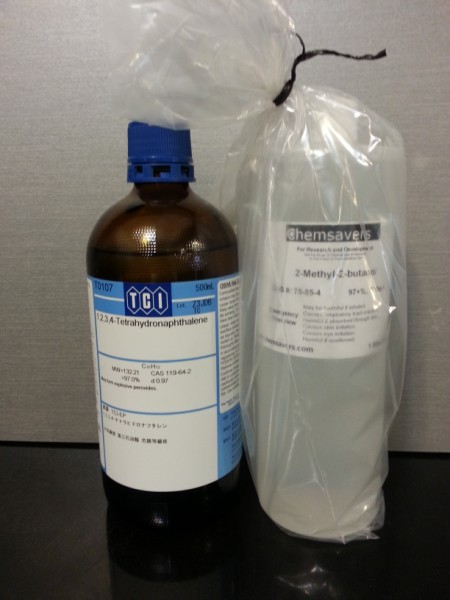
|
|
|
| Pages:
1
..
55
56
57
58
59
..
66 |